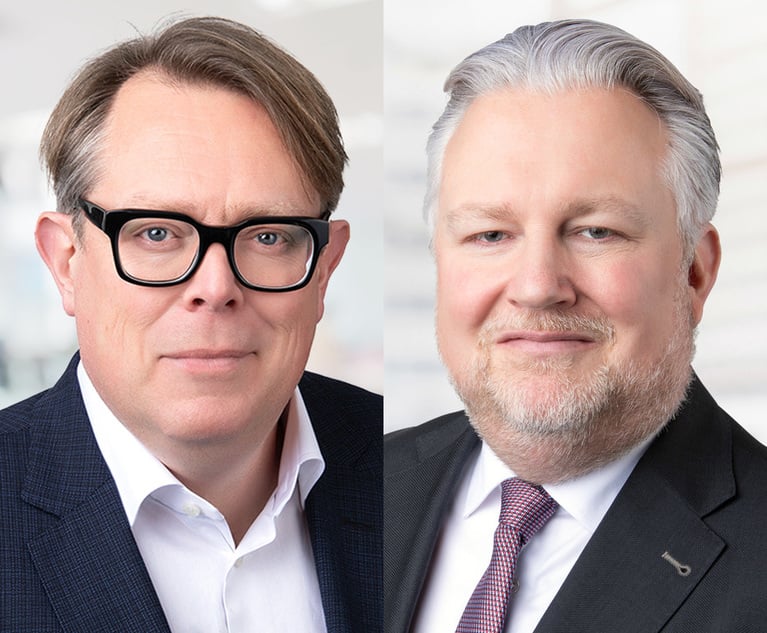How will the loss of a five-partner Paris private equity team hit Ashurst?
Partners react to Freshfields' hire of a five-partner buyout team from Ashurst
February 27, 2017 at 11:45 AM
6 minute read
After a steady stream of partner exits last year – peaking with 12 departures in September – Ashurst's retention problems seemed to have abated. But, despite reassuring messages from London managing partner Simon Beddow, global managing partner Paul Jenkins and global chair Ben Tidswell, the firm has suffered a high profile mass walkout.
Long-rumbling rumours about Ashurst's heavyweight Paris private equity team finally came to fruition earlier this month, when a five-partner group quit for Freshfields Bruckhaus Deringer. They are understood to have been voted in by the magic circle partnership last week.
With the team – private equity partners Guy Benda, Nicolas Barberis and Yann Gozal alongside leveraged finance partners Stephanie Corbiere and Laurent Mabilat – said to be responsible for around one fifth of the Paris office's revenue, what impact will their exit have on Ashurst generally and in particular its private equity practice, which has already seen a number of London exits over recent years?
The group has a longstanding relationship with a number of buyout houses, including Charterhouse Capital and Chequers Capital, and these are understood to contribute around £5m of the office's £25m-£30m turnover.
Recent mandates have seen Benda and Barberis advise Charterhouse on the €400m (£340m) acquisition of tech company Sagemcom from Carlyle Group, as well as its November acquisition of French pharmaceutical group Cooper for a reported €700m (£595m), along with Mabilat. At Freshfields, Barberis will head up its French global financial investors practice.
This month, Gozal and Corbiere advised private equity fund Chequers Capital on the roughly €560m (£477m) sale of airline services company Accelya to US private equity company Warburg Pincus. Other key clients of Ashurst's Paris private equity team, according to Chambers and Partners, include JC Flowers and KKR.
As one former Ashurst private equity partner says: "It's very bad for Ashurst. They can't now do private equity in Paris. They're stuck with an expensive office and far less revenue."
A private equity partner at a US firm's Paris office adds: "Looking at private equity teams in Paris, this was really the ideal target. They're very well regarded – Barberis is the real name at the moment."
While Freshfields has yet to confirm full details of the team's move or whether any associates are joining with the partners, rumours had abounded for months that they were planning to leave.
At one stage the team was being linked with King & Wood Mallesons (KWM), after the now-failed firm suffered a devastating blow in April last year when six partners left to set up Goodwin Procter's office in the French capital.
Tidswell though is undaunted by the exits, arguing that the firm had known about the group's intentions for some time, therefore making it easier to plan around them.
He tells Legal Week: "We have known for some time that we might have some instability in that office. The partners were very transparent and open and we had lots of dialogue with them about their intentions."
He adds: "Part of the pattern we – and other firms – are seeing across Europe is the demand for people operating in the high-end private equity and acquisition finance space. It's a space firms are investing heavily in and we have recognised for some time that people like that in our business are vulnerable to this."
His comments come after Sidley Austin this month picked up a seven-partner team from Kirkland & Ellis in Munich – including a number of private equity partners – while Goodwin has been steadily building up its European private equity team with hires from a range of firms.
In December last year, it hired former Shearman & Sterling private equity partner duo Mark Soundy and Sarah Priestley. This week, it recruited former KWM Luxembourg office managing partner and private equity partner Alexandrine Armstrong-Cerfontaine as a consultant.
Tidswell contends that while Ashurst is sorry to see the Paris team go, there will not be significant fallout from their exit on the rest of the network.
"The team operates a very self-contained practice in high-end French transactional work," he insists. "There is very little crossover with the rest of the business – it is quite siloed."
One current London-based Ashurst partner echoes these sentiments. He says: "They are excellent quality lawyers but [they] act very much in the PE leveraged finance space, and therefore won't impact the office's broader capabilities. It is a blow and will hit us in the back pocket but the office is still very strong."
He adds: "When you have particularly strong partners in a small office, they can dominate the atmosphere and stifle its growth. We will find ways to make this work for us."
Others are less convinced. One recruiter says: "It's a big move and it will have quite a negative impact. That team is probably the most profitable private equity team left at Ashurst. It is a close-knit group with some quite senior members."
According to Tidswell, the firm plans to rebuild in Paris but with a focus on a broader funds offering, rather than just private equity.
"Private equity is just one part of a market in which funds are investing across a very wide asset class, such as real estate and infrastructure assets," says Tidswell. "There's a whole other world out there and we want to support that funds offering across our network; 90% of what we need for that is there already. We need to make sure we have the right finance and corporate capabilities in Paris to support it. We're looking out for people who fit a bit more into the network opportunities instead of a single product."
Despite his optimism, however, it is hard to see the latest exits as anything other than a blow to the firm that will be watched closely by the market.
This content has been archived. It is available through our partners, LexisNexis® and Bloomberg Law.
To view this content, please continue to their sites.
Not a Lexis Subscriber?
Subscribe Now
Not a Bloomberg Law Subscriber?
Subscribe Now
NOT FOR REPRINT
© 2025 ALM Global, LLC, All Rights Reserved. Request academic re-use from www.copyright.com. All other uses, submit a request to [email protected]. For more information visit Asset & Logo Licensing.
You Might Like
View All
German Court Orders X to Release Data Amid Election Interference Concerns

De Brauw Partner Departs for In-House Role with Swiss Family Enterprise

Hengeler Advises On €7B Baltica 2 Wind Farm Deal Between Ørsted and PGE
2 minute read
Trending Stories
- 1States Accuse Trump of Thwarting Court's Funding Restoration Order
- 2Microsoft Becomes Latest Tech Company to Face Claims of Stealing Marketing Commissions From Influencers
- 3Coral Gables Attorney Busted for Stalking Lawyer
- 4Trump's DOJ Delays Releasing Jan. 6 FBI Agents List Under Consent Order
- 5Securities Report Says That 2024 Settlements Passed a Total of $5.2B
Who Got The Work
J. Brugh Lower of Gibbons has entered an appearance for industrial equipment supplier Devco Corporation in a pending trademark infringement lawsuit. The suit, accusing the defendant of selling knock-off Graco products, was filed Dec. 18 in New Jersey District Court by Rivkin Radler on behalf of Graco Inc. and Graco Minnesota. The case, assigned to U.S. District Judge Zahid N. Quraishi, is 3:24-cv-11294, Graco Inc. et al v. Devco Corporation.
Who Got The Work
Rebecca Maller-Stein and Kent A. Yalowitz of Arnold & Porter Kaye Scholer have entered their appearances for Hanaco Venture Capital and its executives, Lior Prosor and David Frankel, in a pending securities lawsuit. The action, filed on Dec. 24 in New York Southern District Court by Zell, Aron & Co. on behalf of Goldeneye Advisors, accuses the defendants of negligently and fraudulently managing the plaintiff's $1 million investment. The case, assigned to U.S. District Judge Vernon S. Broderick, is 1:24-cv-09918, Goldeneye Advisors, LLC v. Hanaco Venture Capital, Ltd. et al.
Who Got The Work
Attorneys from A&O Shearman has stepped in as defense counsel for Toronto-Dominion Bank and other defendants in a pending securities class action. The suit, filed Dec. 11 in New York Southern District Court by Bleichmar Fonti & Auld, accuses the defendants of concealing the bank's 'pervasive' deficiencies in regards to its compliance with the Bank Secrecy Act and the quality of its anti-money laundering controls. The case, assigned to U.S. District Judge Arun Subramanian, is 1:24-cv-09445, Gonzalez v. The Toronto-Dominion Bank et al.
Who Got The Work
Crown Castle International, a Pennsylvania company providing shared communications infrastructure, has turned to Luke D. Wolf of Gordon Rees Scully Mansukhani to fend off a pending breach-of-contract lawsuit. The court action, filed Nov. 25 in Michigan Eastern District Court by Hooper Hathaway PC on behalf of The Town Residences LLC, accuses Crown Castle of failing to transfer approximately $30,000 in utility payments from T-Mobile in breach of a roof-top lease and assignment agreement. The case, assigned to U.S. District Judge Susan K. Declercq, is 2:24-cv-13131, The Town Residences LLC v. T-Mobile US, Inc. et al.
Who Got The Work
Wilfred P. Coronato and Daniel M. Schwartz of McCarter & English have stepped in as defense counsel to Electrolux Home Products Inc. in a pending product liability lawsuit. The court action, filed Nov. 26 in New York Eastern District Court by Poulos Lopiccolo PC and Nagel Rice LLP on behalf of David Stern, alleges that the defendant's refrigerators’ drawers and shelving repeatedly break and fall apart within months after purchase. The case, assigned to U.S. District Judge Joan M. Azrack, is 2:24-cv-08204, Stern v. Electrolux Home Products, Inc.
Featured Firms
Law Offices of Gary Martin Hays & Associates, P.C.
(470) 294-1674
Law Offices of Mark E. Salomone
(857) 444-6468
Smith & Hassler
(713) 739-1250









